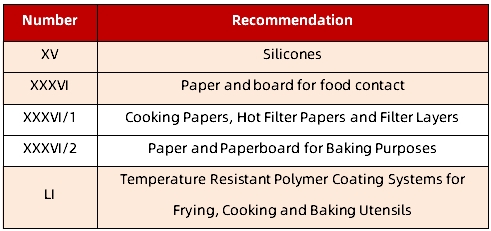On August 1, 2024, the German Federal Institute for Risk Assessment (BfR) updated several food contact recommendations, including those for silicones, paper, and temperature resistant polymer coating, which are effective from the date of publication.
The following is the updated food contact recommendation, which involves the revision of raw materials and additives (including fillers, etc.), among which XV, XXXVI and LI recommendations (namely orange shading recommendations) also update some index requirements and test methods:
The main updates of the index requirements and test methods are as follows:

BfR Recommendation XV-Silicones
1.Modification of volatile organic components test conditions:articles that do not withstand thermal testing according to the above method shall be tested according to the temperature/time conditions specified in Table 3 in Annex V of Regulation (EU) No 10/2011. The old version of this test project test conditions fixed, 200℃, 4h.
2.The requirement that the content of extractable components in silicones is less than 0.5% is removed.
BfR Recommendation XXXVI-Paper and board for food contact
1.Recycled paper has modified the requirements for the migration of phthalates, and the new and old requirements are compared as follows:

*The sum of DBP, DIBP and DEHP, calculated as DEHP equivalents using the equation below, DBP x 5 + DIBP x 4 + DEHP x 1.
2.Delete the remarks of 4,4'-Bis(dimethylamino)-benzophenone, bisphenol A, bisphenol S migration amount in recycled paper "Verification of the specifications is only required if the finished products are intended for use with moist and fatty foodstuffs", and replace with note 3 in the recommendation"Testing is not necessary for paper and paperboard intended for contact with dry and at the same time non-fatty foodstuffs (e.g. flour, semolina, rice, breakfast cereals, breadcrumbs, sugar and salt)".
BfR Recommendation LI-Temperature Resistant Polymer Coating Systems for Frying, Cooking and Baking Utensils
1.Added "overall migration" test requirement with a limit of 10mg/dm2. The overall migration is determined in the third migration and in/under the following simulants and test conditions:
a)95 % ethanol: 6h, bei 60 °C
b)Isooctane: 4h, bei 60 °C
2.Modify the test conditions for specific migration volume, delete the old test conditions, and modify the test conditions as follows:
The test conditions can be found in the Technical Report of the Joint Research Center of the EU Commission on test conditions for kitchen articles15. The conditions for food preparation utensils of classes FPU/H2, FPU/H3 and FPU/H4 for plastic articles are applied. An exception is the testing of items in category FPU/H4. Instead of the specified test time of 8 hours, the contact time is reduced to 4 hours because an 8-hour migration with 3 % acetic acid leads to corrosion of the objects that is not typical for the application.
The test with modified polyphenylene oxides (MPPO) as a simulant is carried out for 2 h at 175°C in accordance with DIN EN 14338.
3.Added element permeability test requirement: The element permeability test is carried out in accordance with the current version of the EDQM Technical Guideline for Metals and Alloys.
CTT proposal
Although the BfR recommendation is not legally binding, it is widely recognized by the industry and has become an important reference basis for products to enter the German market. CTT recommends that relevant enterprises pay attention to the updated content and do a good job in compliance with relevant products as soon as possible.
